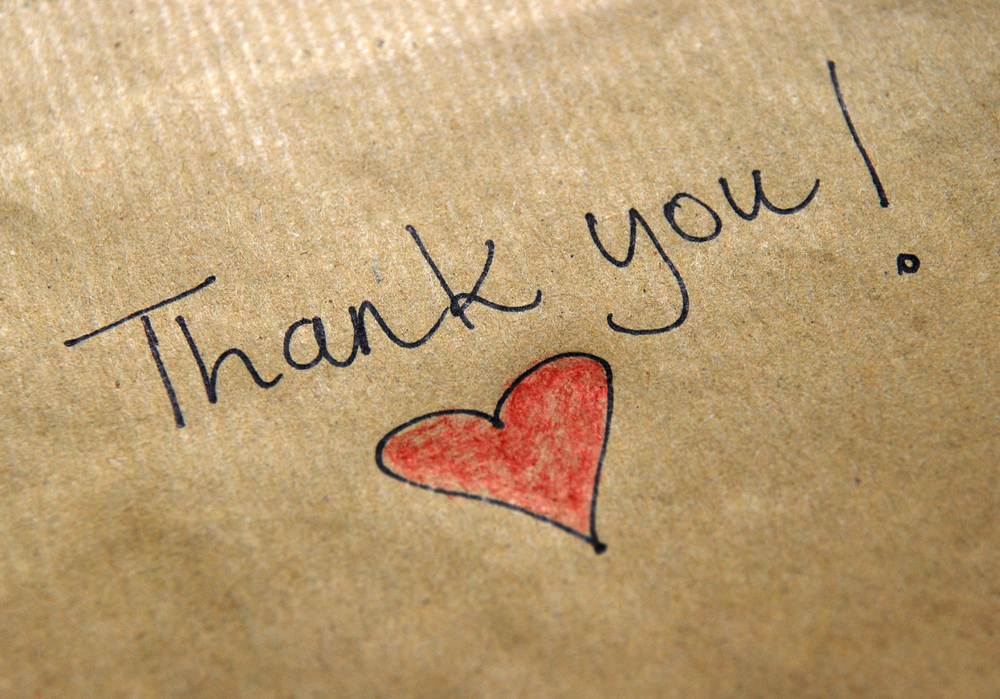
Improve your vocabulary by learning different ways of thanking in the English language.
You thank somebody when they have done something for you or given you something that you trully appreciate. The English language distinguishes between informal and more formal ways of thanking.
Basic Ways of Thanking
If you want to thank somebody in English in a very basic way, you can use the exclamations ‘Thank you‘ or ‘Thanks‘. The exclamation ‘Thank you‘ is more formal, while the exclamation ‘Thanks‘ is informal or casual. For example:
- A: You are a very good employee. B: Thank you, Mr. Black. formal
- A: You’re my best friend, Tanya. B: Thanks, darling. informal
Some speakers, especially speakers of British and Australian English, use the exclamation ‘Cheers!‘ to thank somebody in a very casual way. For example:
- A: I absolutely love your new car! B: Cheers, mate! (the noun mate is used as a friendly way of talking to someone, especially a man)
When you’re thanking somebody for something, you can use the preposition for after the exclamations ‘Thank you‘ and ‘Thanks‘. For example:
- Thank you / Thanks for the delicious dinner.
- Thanks for helping me with my homework, Dad.
Emphatic Ways of Thanking
When you want to thank somebody for something in a very emphatic way, you can add so much, very much, very much indeed or a lot to the exclamations ‘Thank you‘ and ‘Thanks‘. For example:
- Thank you very much for all your help. / Thank you so much for your help.
- A: I’ll call you tomorrow morning. B: Thanks very much indeed.
Warning: You can say ‘Thanks a lot‘, but you can’t say ‘Thank you a lot‘. You also can’t say ‘Cheers very much‘ or ‘Cheers a lot‘.
In English, gratitude can be expressed in a number of different ways. For example:
- A: If you need me, just call me. B: That’s very kind of you.
- I can’t tell you how grateful I am for all your help.
More Formal Ways of Thanking
More formal occasions require more formal ways of thanking. You can thank somebody more formally by saying ‘I want to thank you for…‘,’I would (I’d) like to thank you for…‘ or ‘I really appreciate it‘. For example:
- I want to thank you for your advice, Mr. President.
- I’d like to thank you for your hospitality, Mrs. Dion.
- Thank you for reading my book. I really appreciate it.
Thanking Someone for a Present
When you’ve been given a present, you can express your gratitude by saying ‘Thank you‘, or something like ‘It’s lovely‘. For example:
- Thank you for the present. It’s lovely!
Sometimes, when people are given a present, they say ‘You shouldn’t have‘ as a polite way of indicating that they are very grateful for it. For example:
- A: Here. This present is for you. B: Oh, honey, you shouldn’t have!
Thanking Someone for an Enquiry
Sometimes people ask you how you are or how a member of your family is, and sometimes people ask you if you have had a nice holiday or weekend. In reply, you can use the exclamations ‘Thank you‘ or ‘Thanks‘. For example:
- A: How are you, my friend? B: Fine, thank you / thanks.
- A: David, did you have a nice weekend? B: Lovely, thank you.
Replying to Thanks
A response to a thank you is not necessary in British English. Did you know that the British do not always automatically respond to a thank you? Replying to thanks is much more common in American English; however, a response to a thank you is becoming more and more frequent in Britain too. People in the United States and Britain often say ‘You’re welcome‘ or ‘No problem‘ when replying to thanks. For example:
- A: Thank you for carrying my shopping. B: You’re welcome. / No problem.
If you want to sound very polite and friendly at the same time, you can say ‘My pleasure‘, ‘It’s a pleasure‘ or ‘Pleasure‘. For example:
- A: Thank you very much for the lecture, Dr. James. B: It’s a pleasure. / My pleasure. / Pleasure.
If you want to sound casual, then you can use ‘Any time‘. For example:
- A: You’ve been very helpful. B: No problem. Any time.
Sometimes people express their gratitude in a very emphatic way. You can reply by using the expressions ‘It was no trouble‘, ‘It was nothing‘ or ‘Not at all‘. For example:
- A: I’m immensely grateful for all your help. B: It was no trouble. / It was nothing.
- A: I’m enormously grateful for your kind words, Mr. President. B: Not at all.
This article has showed you that gratitude can be expressed in a number of different ways in the English language. Practice these expressions as often as you can in conversation with other English-speaking people and soon you will be able to remember them all. r
